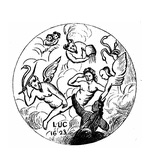
Choose Your Own Eternity
LOOKING BEYOND REWARD & PUNISHMENT
…he saw there a man who had no wedding garment. — Matthew 22:11
Many in today’s world dismiss the idea of Hell as incompatible with a loving God. On the other hand, there are those who insist that justice is only possible if a fiery and punitive Hell awaits the unjust. Though Hell’s deniers might be motivated by a desire to secure their own salvation without cost, they are magnanimous in offering all a free ride to Heaven. However, among those who insist on the existence of Hell, there often appears a self-righteous satisfaction in knowing the unjust will receive their due. Rather than concern for the souls of the damned, this sympathy more closely resembles the Schadenfreude of an audience at a public execution. Their satisfaction, derived from another receiving his just due, is really a justification of and satisfaction with their own righteousness. Such a position not only lacks the Christian virtues of humility and mercy but dangerously courts the sin of pride. Though Hell might indeed be filled with miscreants, and this might be readily acknowledged as simple fact in the comfort of Heaven, assuming the damnation of others while still earthbound dangerously presumes the power of judgment that belongs to God alone.
Perhaps we can escape this quandary if we consider Hell as something more than punishment. This can be difficult because many of us grew up in Christian homes where reward and punishment dispensed by a loving God were the meat and potatoes of our childhood theology. Rather than dismiss this, perhaps we should see this as a necessary starting point, not only of children learning but of all fallen men. Perhaps to see our destiny in terms of reward and punishment is to “see in a mirror, dimly” before we see “face to face” (1 Cor. 13:12), before we clearly see who we are and who God is. Perhaps, too, we can begin to see in a mirror more clearly if we can see in Jesus’ parable of the wedding feast that the man who came to the feast without a wedding garment was not punished but was already in Hell before the King “cast him into the outer darkness” (Mt. 22:13).
In his encyclical Spe Salvi (2007), Pope Benedict XVI tells us that life “is not something we have exclusively in or from ourselves”; rather, “it is a relationship” (no. 27). To truly live is not merely to be biologically animate but to be in a relationship. Ultimately, it is to be “in relation with him who does not die, who is Life itself and Love itself.” If this is so, then we are “in life.” To be “in life” is to attend the feast where we share with all of the guests in the King’s joy at the wedding of his son. The joy is inherent in the sharing, in the passing of joy from one to another.
You May Also Enjoy
An artist who apparently works very much from his feelings and intentions, Fellini turns his camera on people and lovingly watches their foibles and failures.
In Catholic doctrine, God gives us free will, so we can repent or not. Kendall gets free will and predestination mixed up. Embarrassing!
Kirsch's absorbing personality profile of the scrupulous, dogmatic, and uncompromising John portrays him as a man in great distress in a pagan culture.

